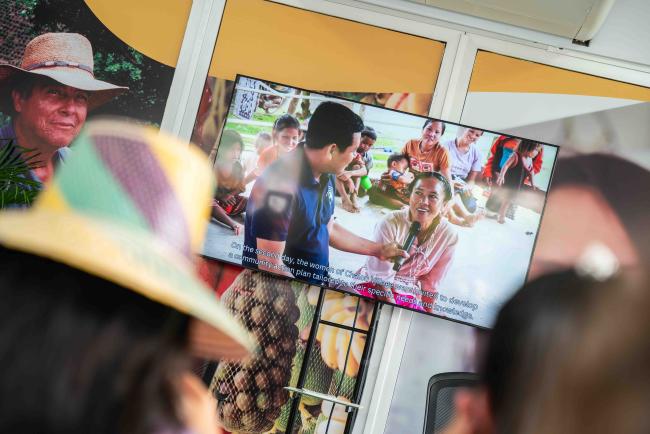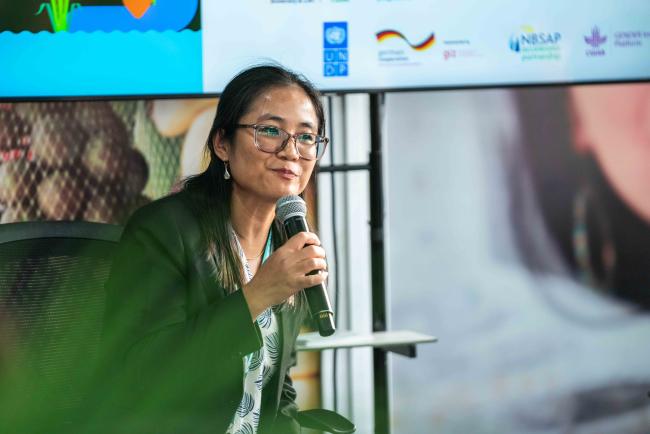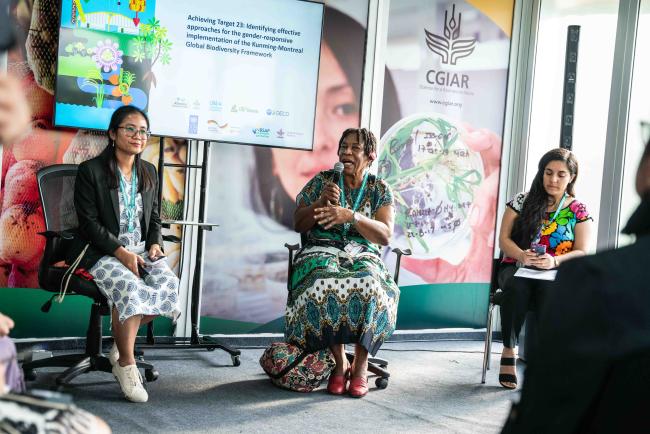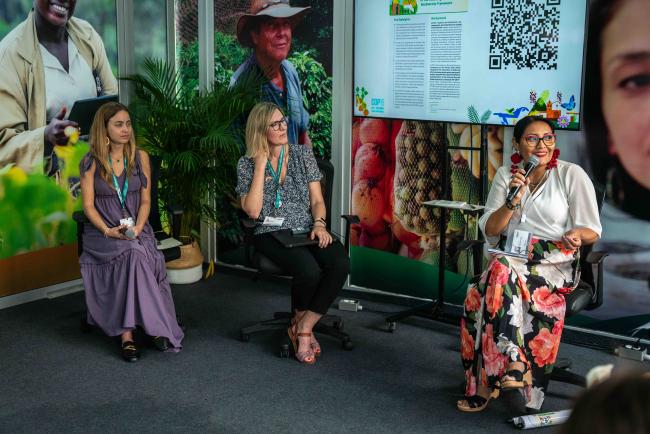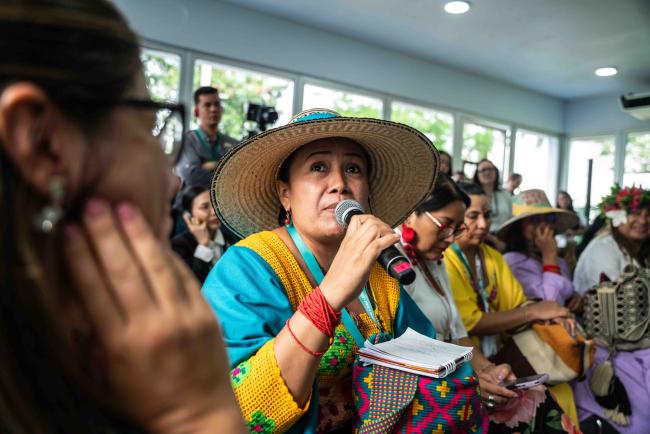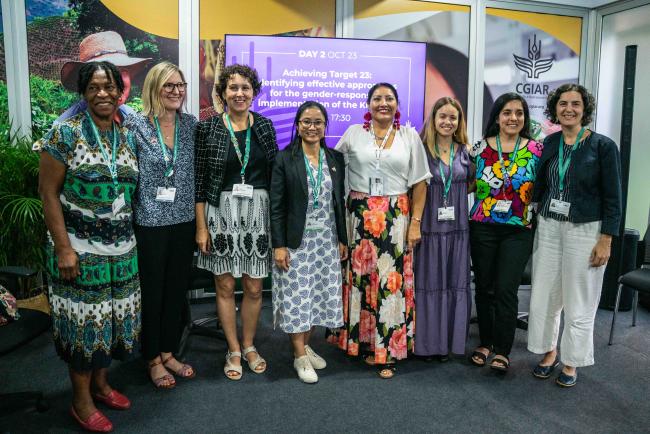About
With momentum increasing for implementation of the Kunming-Montreal Global Biodiversity Framework (GBF) and its targets, the issue of gender-responsiveness finds itself at the forefront of addressing the inequalities that drive the biodiversity crisis. This event invited attendees to reflect on different approaches to achieve gender equality in the context of the global biodiversity targets.
Marléne Elias, Alliance of Bioversity International and the International Center for Tropical Agriculture/CGIAR, welcomed attendees to the event, which opened with a video presentation showing the women of Chalou village, a buffer zone of Hin Nam No National Park in Lao People’s Democratic Republic (Lao PDR). She said the inequalities that drive the biodiversity crisis should be addressed at this critical juncture, bringing attention to Target 23 of the GBF, which focuses on equitable participation of women.
Amelia Arreguín Prado, CBD Women’s Caucus, introduced the CGIAR policy brief, Placing Gender Equality at the heart of the implementation of the Kunming-Montreal Global Biodiversity Framework as the basis for discussions during the event. She posed specific questions for each of the panelists.
The first panel considered the full and effective participation of grassroots women in all actions at all levels. Ruth Spencer, local communities representative from Antigua and Barbuda, shared her thoughts and experiences on strengthening the role that women play in achieving gender-responsive implementation of the GBF. She noted that women and local communities are key to GBF implementation and that they should not be left behind. She urged proactive actions and a mindset to empower them by bringing the information that is needed in an understandable and culturally accepted manner. She highlighted inclusivity, trust building, honesty, and respect as elements that enable such a transformation.
Phetlasy Souladeth, National University of Laos, elaborated on her country’s experience in engaging grassroots women in biodiversity policy and programmes. She highlighted efforts of women-led initiatives shown in the video, including those involving fish conservation, where women teach each other to avoid fishing during gestation periods in order to sustain aquatic resources. She shared that in her culture, women – particularly women from ethnic minorities – play the role of land managers, traditional knowledge holders, and resource users. She encouraged recognizing the invaluable contribution of women and continuing to prioritize gender equality in conservation strategies.
Cate Owren, United Nations Development Programme (UNDP), opened the second panel on capacity strengthening. She highlighted the importance of empowering women and girls to claim access to information, to decision makers and decision making, and to implementing institutions. She reported on the results of a review on the CBD’s previous Gender Plan of Action (2015–2020), noting that countries identified capacity building as the biggest challenge for implementation, alongside lack of data, data analysis, and a monitoring framework on gender capacity.
Owren then focused on the CGIAR policy brief. She explained that it contains specific guidance for parties to support gender-responsive implementation of the GBF, including: building women’s technological and negotiating skills; bringing financial and technical support to women’s groups; enhancing knowledge-sharing platforms; and designating and supporting national gender and biodiversity focal points. She also shared key priorities for UNDP efforts to accelerate gender-responsive GBF implementation, including: supporting countries to identify country-specific, locally-led solutions to chronic gender barriers; reforming and revising National Biodiversity Strategies and Action Plans (NBSAPs) based on contextualized knowledge; and sustaining long-term support for gender action with the goal of creating structural change.
Hortencia Hidalgo, Red de Mujeres Indigenas sobre Biodiversidad, Latin America and the Caribbean (RMIB-LAC), spoke on how RMIB-LAC has contributed to closing capacity gaps. She described RMIB-LAC’s creation of a biodiversity diploma programme for Indigenous women leaders in response to the lack of Indigenous women’s participation in CBD processes, noting her organization’s 23-year history with the CBD. RMIB-LAC also funded and worked with women from Indigenous communities from across LAC to adapt the 23 GBF targets into appropriate Indigenous cosmovisions, and to work with national governments to integrate their priorities into national frameworks.
Dominique Blaquier, Organisation for Economic Co-operation and Development (OECD), spoke on OECD’s work to close the financial gap. She shared an overall positive overlook of recent trends in development finance for biodiversity and gender equality, as well as in mainstreaming the gender-biodiversity nexus in development finance. She also underscored that key priorities now include: better data on biodiversity-related development finance; an alignment of development cooperation and biodiversity action; and mobilization of private finance.
During both panels, attendees shared their views and experiences on how women can be united in participating in high-level discussions for strengthening their capacities. They also highlighted challenges women face that exclude them from decision making, and how balance can be achieved taking into account the particularities and vulnerabilities of women and Indigenous communities.
During closing remarks, Tanya McGregor, UN Environment Programme (UNEP), reflecting on efforts to include Target 23 within the GBF, she highlighted momentum on gender equality and praised the endeavours of the CBD Women’s Caucus. She reminded attendees of the need to engage people at all levels, and to keep paying attention to communities that need to participate the most.
Organizers: CGIAR
Contact: marlene.elias@cgiar.org
For more information: https://gender.cgiar.org
To receive free coverage of global environmental events delivered to your inbox, subscribe to the ENB Update newsletter.
All ENB photos are free to use with attribution. For the 2024 UN Biodiversity Conference, please use: Photo by IISD/ENB | Mika Schroder
